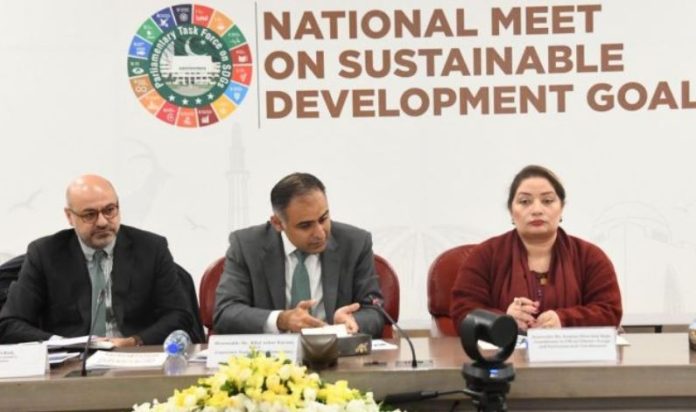ISLAMABAD, Dec 20 (DNA/APP):Coordinator to Prime Minister on Climate Change, Romina Khurshid Alam emphasised that despite contributing less than one percent in the total global carbon emissions, Pakistan ranks as the 5th most impacted country in the world due to climate change. Speaking at a national meeting on Sustainable Development Goals (SDGs) here on Friday, she informed the participants that the effects of global warming are already visible in Pakistan, citing increasing frequency of droughts, floods, erratic weather patterns, changing agricultural practices, dwindling freshwater supplies, and loss of biodiversity.
The recurring adverse impacts of global warming on the country’s various socioeconomic sectors, particularly agriculture, energy, water, health and education have already put the country’s efforts for achieving sustainable development goals at stake, she added.
“Frequent, prolonging and intensifying droughts and floods disrupt agriculture, jeopardising food security and livelihoods across Pakistan,” remarked Ms. Romina and added: “The Constitution of Pakistan guarantees the right to a clean, healthy and sustainable environment; and thus, environmental protection is a fundamental human right for all Pakistanis.”
She recalled that the devastating climate-induced floods of 2022, which resulted in over $30 billion in damages, served as a stark reminder of Pakistan’s vulnerabilities. These costs continue to rise as Pakistan grapples with severe economic challenges, including rising inflation, high indebtedness, currency depreciation, and depleted foreign reserves, the PM’s climate aide added.
She highlighted that SDG-13 (Climate action) underpins and is the cornerstone for achieving our ambitious sustainable development goals and targets, which calls for taking urgent coping actions to combat climate change and its adverse impacts on various socioeconomic sector.
“To achieve the climate action SDG goal, we need to focus on integrating climate change concern into national policies, enhancing education and awareness, and improving institutional capacities for climate change mitigation, adaptation, and strengthening early warnings for effective disaster management,” the PM’s climate aide suggested.
Ms. Romina warned that the cost of inaction on climate change is staggering. Referring to the World Bank’s Climate and Development Report for Pakistan, she pointed out that the country needs $348 billion in climate finance from 2023 to 2030 to address its adaptation, mitigation, and resilience needs. However, the available financial resources remain limited, the PM’s aide highlighted.
Despite these challenges, Pakistan has made significant strides, using its own limited budgetary and technical resources.
Sharing adaptation and mitigation policy measures of the present government, Romina Khurshid Alam explained, “The Green Pakistan Programme, launched by the climate change and environmental coordination ministry is helping sequester 149 MtCO2e through reforestation, biodiversity initiatives and the protection of critical areas. Our Electric Vehicle (EV) policy is set to reduce emissions by 23 MtCO2e by 2030, while our renewable energy policy is expected to save 70 MtCO2e by the same year.
Ms. Romina also informed the participants that the Ministry of Climate Change and Environmental Coordination (MoCC&EC) is actively working on Pakistan’s biennial transparency report (BTR) and Third National Communication (TNC), fulfilling UNFCCC and Paris Agreement reporting obligations.
Efforts on Nationally Determined Contribution (NDC) 3.0 are in progress, aligning Pakistan’s climate goals with the Paris Agreement. Additionally, policy guidelines for carbon market trading are nearing completion, and a national climate finance strategy has been developed to enhance resource allocation, she added.
“Climate budget tagging is also underway to track climate-related expenditures transparently. A Green Tech Hub has been launched to drive innovation in climate technology, and we have strengthened international cooperation through engagements with the CVF-V20, Global Shield, UK Green Compact, and other partners to mobilize climate finance for resilience-building initiatives,” the PM’s climate aide said.
Ms. Romina also highlighted the establishment of the Pakistan Climate Change Authority, which is strengthening institutional capacity to address climate challenges effectively. She noted the Ministry’s role in hosting the Asian Forum of Parliamentarians on Population and Development (AFPPD) Climate and Gender Conference in Islamabad, which led to the issuance of the Islamabad Declaration on Climate Change and Gender Equity.
“Pakistan is committed to confronting the climate crisis with urgency and determination, as we work towards a sustainable future for all,” concluded Ms. Romina.

















